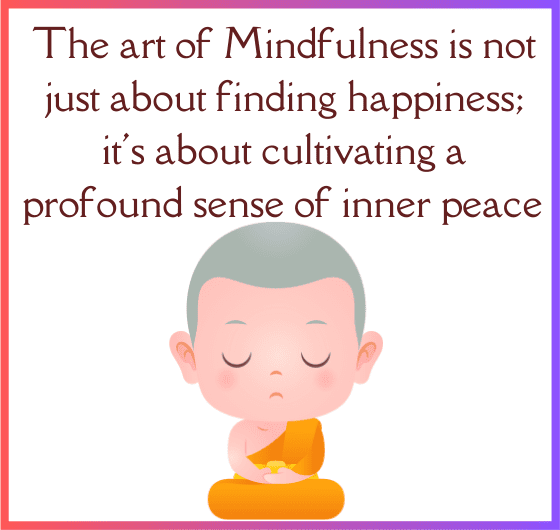The art of mindfulness has been a part of Indian culture for thousands of years, providing a pathway to lasting happiness and well-being. Through practices such as yoga, meditation, and Breathwork, individuals can learn to cultivate a deeper sense of awareness and acceptance of the present moment.
This can lead to reduced stress levels, improved mood, and a greater sense of inner peace.
Mindfulness practices also promote greater self-awareness, allowing individuals to better understand their own emotions and thought patterns.
In India, mindfulness is not just a tool for personal growth, but a way of life. By incorporating mindfulness practices into daily routines, individuals can tap into the power of ancient Indian traditions and unlock the secrets to lasting happiness.
“Mindfulness is the key to unlocking the door to true happiness, and living a life of purpose and meaning.” – Sharon Salzberg

The Benefits of Mindfulness for Happiness in Indian Culture
Mindfulness is a practice that has been a part of Indian culture for centuries. It involves being fully present and aware of one’s thoughts, feelings, and surroundings, without judgment. Mindfulness has been shown to have numerous benefits for happiness in Indian culture, including:
>> Reducing stress and anxiety.
>> Improving focus and concentration.
>> Enhancing Emotional Regulation and Resilience.
>> Improving relationships and social connections.
>> Boosting overall well-being and life satisfaction.
In addition to these benefits, mindfulness is also deeply ingrained in Indian spiritual and philosophical traditions, such as yoga and Buddhism.
By cultivating mindfulness, individuals in Indian culture can connect with their spiritual roots and achieve greater inner peace and contentment. With its proven benefits for happiness and well-being, mindfulness is a valuable tool that can help individuals in Indian culture lead happier, more fulfilling lives.
“Mindfulness is the key to unlock the door to true happiness.” – Gurudev Sri Sri Ravi Shankar
Mindfulness and happiness go hand in hand, and this is especially true in Indian culture. Here are some benefits of mindfulness for happiness in India:
>> Mindfulness helps to reduce stress and anxiety.
>> It increases emotional regulation and resilience.
>> It enhances self-awareness and empathy.
>> It improves focus and concentration.
>> It promotes better sleep and overall well-being.
By incorporating mindfulness practices into their daily routines, Indians can experience greater happiness and fulfillment in life.
Mindfulness can be practiced through activities like meditation, yoga, or simply taking a few moments to focus on the present moment.
The Role of Meditation in Promoting Happiness in India
Meditation has been a part of Indian culture for centuries and is known to promote mindfulness and inner peace. It has been proven to have a significant impact on mental health and happiness.
Here are some ways meditation can help promote happiness in Indian culture:
>> Reducing stress and anxiety levels.
>> Improving emotional well-being.
>> Increasing self-awareness and self-esteem.
>> Enhancing overall health and well-being.
>> Promoting positive thinking and gratitude.
Meditation can be practiced in various forms such as mantra meditation, mindfulness meditation, and guided meditation. It can be done individually or in groups, and the benefits can be experienced in just a few minutes of practice each day.
Incorporating meditation into daily routines can help promote a happier and more fulfilling life in Indian culture.
Meditation is a powerful tool for promoting happiness in India. It has been used for centuries to calm the mind, reduce stress and anxiety, and cultivate inner peace.
Through regular practice, meditation can help individuals achieve greater emotional balance and overall well-being.”
“In the present moment, there is no room for fear or anxiety. Mindfulness leads to happiness” – Buddha

Mindfulness Practices for stress reduction and Happiness in India
Mindfulness practices have been an integral part of Indian culture for centuries. In recent times, there has been a resurgence of interest in mindfulness practices, which has been attributed to their potential to promote emotional well-being, reduce stress, and enhance happiness.
Here are some mindfulness practices for stress reduction and happiness in India:
1.. Yoga: Yoga is a popular mindfulness practice that involves physical postures, breathing techniques, and meditation to promote relaxation and reduce stress.
2. Meditation: Meditation is a powerful mindfulness practice that involves focusing the mind on a particular object or thought to achieve a state of relaxation and inner peace.
3. Pranayama: Pranayama is a breathing technique that involves deep breathing exercises to calm the mind and promote relaxation.
4. Mindful eating: Mindful eating involves being present and fully engaged in the act of eating, paying attention to the flavors, textures, and sensations of food.
By incorporating these mindfulness practices into their daily lives, individuals in India can reduce stress, enhance emotional well-being, and experience greater happiness.
“True happiness comes from within, when we cultivate a mindful and compassionate state of being.” – Deepak Chopra
The connection between Yoga and Mindfulness for Happiness in India
Yoga and mindfulness are interconnected practices that have been used for centuries in India to promote happiness and overall well-being. Here are some ways in which yoga and mindfulness contribute to happiness in Indian culture:
>> Yoga and mindfulness can help reduce stress and anxiety, leading to a more positive outlook on life.
>> The physical postures and breathing exercises in yoga can improve overall physical health, which is essential for a happy life.
>> Mindfulness meditation practices can improve emotional regulation and increase feelings of gratitude and compassion.
>> Practicing yoga and mindfulness together can lead to a deeper mind-body connection, helping individuals feel more grounded and present in their daily lives.
>> Yoga and mindfulness can promote a sense of community and connection, as many people practice these techniques together in group settings.
Overall, yoga and mindfulness are powerful tools that can promote happiness and well-being in Indian culture and beyond.
“The purpose of our lives is to be happy, and mindfulness is the path to true happiness.” – Dalai Lama

The Impact of Mindfulness on Relationships and Happiness in India
Mindfulness is a valuable tool for improving relationships and happiness in India. By being mindful, individuals can become more present and attentive in their interactions with others, leading to better communication and deeper connections. Here are some key points to consider:
** Mindfulness helps to reduce stress and anxiety, which can improve the overall quality of relationships.
** By being mindful, individuals can become more empathetic and understanding, leading to stronger relationships.
** Mindfulness can improve emotional regulation, allowing individuals to respond to challenging situations with greater patience and kindness.
** Mindful communication can help to resolve conflicts in a more effective and compassionate manner, leading to greater relationship satisfaction.
** By practicing mindfulness together, couples and families can deepen their connections and foster a greater sense of intimacy and togetherness.
In summary, incorporating mindfulness into daily life can have a profound impact on relationships and overall happiness in India.
The Effect of Mindfulness on workplace Happiness in India
“Mindfulness means paying attention in a particular way: on purpose, in the present moment, and nonjudgmentally.” – Jon Kabat-Zinn
Mindfulness is becoming increasingly popular in the workplace as a way to enhance employee well-being, productivity, and happiness.
In India, where work-life balance can be challenging, mindfulness practices can be particularly effective. Here are some ways mindfulness can help promote workplace happiness in India:
** Mindfulness practices like meditation and breathing exercises can help employees reduce stress and increase focus and clarity.
** Mindfulness can improve communication and collaboration among team members, leading to better relationships and a more positive work environment.
** Mindfulness can help employees feel more connected to their work, find more meaning and purpose in their jobs, and increase job satisfaction.
** Mindfulness practices can help employees maintain a healthy work-life balance, leading to less burnout and more overall happiness.
By incorporating mindfulness practices into the workplace, companies in India can help create a more positive and productive work environment, leading to greater employee happiness and satisfaction.
The Significance of Mindfulness in Indian spiritual traditions and Happiness.
Mindfulness is a practice that has been deeply rooted in Indian spiritual traditions for centuries. Its focus on being present at the moment, with awareness and non-judgment, has been shown to promote happiness and well-being. Here are some ways in which mindfulness is significant in Indian spiritual traditions:
** Mindfulness is a key element of many meditation practices in India, including Vipassana, which emphasizes the development of self-awareness and introspection.
** The concept of mindfulness is also present in the ancient Indian philosophy of yoga, which emphasizes the importance of being present and attentive during physical postures and Breathwork.
** Mindfulness is also a core component of Ayurveda, the traditional Indian system of medicine, which promotes holistic health and wellness through mindfulness practices such as meditation, deep breathing, and mindful eating.
** Many Indian spiritual leaders and gurus have emphasized the importance of mindfulness as a path to inner peace and happiness, including Mahatma Gandhi and Sri Sri Ravi Shankar.
Overall, the integration of mindfulness into Indian spiritual traditions highlights the importance of cultivating present-moment awareness and self-reflection for achieving happiness and well-being.
“Through mindfulness, we can transform our minds and hearts, and cultivate lasting happiness and inner peace.” – Sharon Salzberg

The Benefits of Mindfulness-based cognitive therapy for Depression and Happiness in India
Mindfulness-based cognitive therapy (MBCT) has gained popularity in recent years as a form of therapy for depression and anxiety. In India, where mindfulness practices have long been a part of spiritual traditions, MBCT is also being used to promote happiness and well-being.
Here are some of the benefits of MBCT for depression and happiness in India:
>> MBCT helps individuals recognize and break patterns of negative thinking that contribute to depression and anxiety.
>> Mindfulness practices in MBCT help individuals become more aware of their thoughts, feelings, and bodily sensations, promoting greater self-awareness and emotional regulation.
>> Through regular practice, MBCT can help individuals develop a more compassionate and accepting attitude toward themselves and others, leading to increased feelings of happiness and well-being.
>> MBCT has been found to be particularly effective in preventing relapse of depression and promoting long-term mental health.
Incorporating mindfulness practices such as MBCT into mental health treatment in India can provide a valuable tool for promoting happiness and well-being.
Mindfulness-based cognitive therapy (MBCT) has been shown to help alleviate symptoms of depression and promote happiness in India.
Incorporating mindfulness practices into daily routines can have a positive impact on mental health and overall well-being.
The Connection between Mindfulness and Gratitude for Happiness in India
In Indian culture, the practice of mindfulness and gratitude has been long associated with happiness and well-being. Mindfulness involves focusing one’s attention on the present moment, while gratitude refers to appreciating the good things in one’s life.
Together, these practices can have a profound impact on happiness. Here are some ways in which mindfulness and gratitude can promote happiness in India:
>> Mindfulness helps one become aware of the present moment, which can lead to a greater appreciation of life’s simple pleasures.
>> Practicing gratitude can shift one’s focus from negative to positive emotions and help build resilience.
>> Mindfulness and gratitude can improve one’s relationships with others by fostering a greater sense of compassion and empathy.
>> Both practices have been shown to reduce stress and anxiety, leading to greater overall well-being and happiness.
By incorporating mindfulness and gratitude into daily life, individuals in India can experience greater levels of happiness and fulfillment.
“Happiness is not something ready made. It comes from your own actions, through mindfulness and self-awareness” – Mahatma Gandhi
The role of mindfulness in promoting overall well-being and happiness in India.
India has a rich tradition of mindfulness, which has been passed down through generations. Mindfulness practices, such as meditation and yoga, have been shown to have a positive impact on overall well-being and happiness. Here are some ways in which mindfulness promotes well-being and happiness in India:
** Mindfulness reduces stress and anxiety, which are major contributors to poor mental health.
** Mindfulness enhances focus and concentration, which can improve productivity and overall performance.
** Mindfulness helps individuals connect with their emotions, which can improve their relationships with others.
** Mindfulness promotes self-awareness and self-acceptance, which can lead to a more positive self-image.
** Mindfulness helps individuals cultivate a sense of gratitude, which can increase overall happiness and well-being.
By incorporating mindfulness into their daily lives, individuals in India can promote their overall well-being and happiness.
Whether it’s through yoga, meditation, or other mindfulness practices, the benefits of mindfulness are numerous and can have a lasting impact on one’s life.
Give me 3 Interesting facts about Art of Mindfulness and Happiness in India
1.. Mindfulness and meditation have been a part of Indian culture for thousands of years.
The ancient practice of yoga, which includes both physical posture and meditation, originated in India and has been passed down through generations.
2. Studies have shown that mindfulness practices, such as meditation and yoga, can have significant benefits for mental health and well-being.
For example, a study conducted in India found that a daily meditation practice helped reduce symptoms of depression and anxiety in participants.
3. In recent years, mindfulness has become increasingly popular in India and around the world, with many people turning to meditation and other mindfulness practices as a way to cope with stress and improve their overall well-being.
In fact, India is now home to a growing number of mindfulness centers and retreats, where people can go to learn and practice meditation and other mindfulness techniques.

Vipassana Meditation: Its Benefits and Significance in Happiness.
Vipassana meditation, an ancient practice originating in India, has gained worldwide recognition for its transformative effects on the mind and body. Rooted in the teachings of Gautama Buddha, Vipassana, meaning “insight” or “clear-seeing,” focuses on cultivating awareness and mindfulness through deep introspection.
Let’s explore the significance, key points, and benefits of this profound meditation technique.
Firstly, Vipassana holds immense significance in promoting self-awareness. By observing the breath, bodily sensations, and mental processes, practitioners develop a deep understanding of their inner workings.
This heightened awareness allows them to gain insights into the impermanence and interconnectedness of all phenomena, leading to a more profound understanding of reality.
One of the key points of Vipassana is the practice of non-reactivity. During meditation, practitioners learn to observe their thoughts, emotions, and sensations without judgment or attachment.
This equanimous observation helps them break free from conditioned patterns and allows for a more peaceful and balanced state of mind.
Moreover, Vipassana emphasizes the importance of moment-to-moment awareness.
By anchoring their attention to the present moment, practitioners learn to let go of regrets about the past and worries about the future. This cultivates a sense of inner calm and contentment.
The benefits of Vipassana meditation are extensive. Scientific studies have shown that regular practice can reduce stress, anxiety, and depressive symptoms.
By developing a non-reactive and observant mindset, individuals gain emotional resilience and the ability to navigate life’s challenges with greater ease.
Furthermore, Vipassana promotes self-discovery and personal growth. Through sustained practice, individuals gain deep insights into their own patterns of thoughts, emotions, and behaviors.
This heightened self-awareness allows for positive behavioral changes and a greater sense of personal well-being.
In conclusion, Vipassana meditation is a powerful practice that offers numerous benefits for mental, emotional, and spiritual well-being. Its significance lies in cultivating self-awareness, non-reactivity, and moment-to-moment presence.
By embracing Vipassana, individuals can experience profound personal growth, reduced stress, and an increased sense of inner peace.
Mindfulness Story:
The Wise Sage: A Tale of Mindfulness Taught by a Guru
Once upon a time, in a small village nestled amidst lush green valleys, there lived a wise and revered guru. People from far and wide sought his counsel, hoping to find solace and wisdom. Amongst his many teachings, mindfulness was his most cherished lesson.
The guru believed that true happiness and contentment could only be found in the present moment. He would often share stories of his own journey toward mindfulness, emphasizing the importance of being fully aware of one’s thoughts, emotions, and sensations.
Word about the guru’s teachings spread like wildfire, reaching the ears of a young man named Raj. Intrigued by the idea of mindfulness, Raj decided to embark on a pilgrimage to meet the wise sage.
After a long and arduous journey, Raj finally reached the humble abode of the guru. With great anticipation, he sought the guru’s guidance on how to attain mindfulness.
The guru welcomed Raj with a warm smile and imparted his wisdom. He explained that mindfulness was about paying attention to the present moment without judgment, fully immersing oneself in the experience. He taught Raj various techniques, such as focusing on the breath, observing sensations, and cultivating gratitude.
Over the following days, Raj diligently practiced the guru’s teachings. He would sit in silence, observing the rise and fall of his breath, letting go of thoughts that arose in his mind. Slowly, he began to experience a sense of peace and clarity he had never known before.
As Raj continued his practice, he noticed profound changes in his life. He became more patient, compassionate, and connected to the world around him. Simple joys, like the rustling of leaves or the chirping of birds, brought him immense happiness.
Raj returned to his village, carrying the guru’s teachings within his heart. He shared the wisdom of mindfulness with his fellow villagers, encouraging them to embrace the present moment and find joy in the simple pleasures of life.
And so, the ripple effect of the guru’s teachings spread throughout the village, transforming the lives of many. Through the mindful presence taught by the wise sage, the villagers discovered a profound sense of peace and contentment, forever grateful for the gift of mindfulness.
In conclusion, this is the tale of a guru who imparted the wisdom of mindfulness to a young seeker. Through the guru’s teachings, Raj and the villagers learned to embrace the present moment, finding true happiness in the beauty of their surroundings and the depth of their own hearts.
May we all be inspired to cultivate mindfulness in our lives and experience the profound joy it brings.
Riddles make life Better: Answer in the comments
Riddle 1: I am a state of being, a peaceful embrace, When fully present, worries I erase. In each breath and step, I can be found, Embracing this moment, I help you rebound. What am I?
Riddle 2: I am a practice that brings you bliss, A moment of stillness, not to miss. When thoughts drift away, and you’re fully aware, Happiness arises, beyond compare. What am I?
Riddle 3: I am a quality that nurtures the soul, In gratitude and kindness, I make you whole. Being fully present, and appreciating the little things, I spread joy and happiness, like angelic wings. What am I?
Riddle 4: I am a treasure hidden within, In each experience, I help you begin. When you savor the flavors, and feel the touch, Happiness blooms, and you’re never in a rush. What am I?
Riddle 5: I am a practice of self-love and care, Taking time for yourself, and becoming aware. In nature’s embrace or a peaceful retreat, I help you find happiness, in moments so sweet. What am I?
These riddles aim to engage and entertain while highlighting the connection between mindfulness and happiness. Enjoy pondering their solutions and sharing them with others to enhance the user experience!
Answer 1: Mindfulness
Answer 2: Meditation
Answer 3: Mindful Awareness
Answer 4: Sensory Awareness
Answer 5: Self-Care Mindfulness

